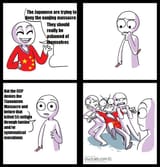Search Results
7/3/2025, 3:05:58 PM
>>509394335
>In 1961, Mao Zedong told Japanese Socialist Party advisor Shūnō Kuroda: "......occupied most of China in the past, so the Chinese people received an education. Without the Chinese War of Resistance against Japan, the Chinese people would not have been enlightened nor would they have been united, so that we would still be in the mountains and would not be able to go to Beijing to see Peking Opera. It was because the Japanese imperial army had occupied most of China and there was no other way out for the Chinese people that they became aware and started armed struggle, establishing many anti-Japanese bases and creating the conditions for victory in the subsequent war of liberation. The Japanese monopoly capital and warlords did a 'good deed' for us, and I would like to thank the Japanese warlords if I need to thank them." In the conversation, Mao also expressed the meaning that "the relationship with the people should be treated differently from the relationship with the government" and that "the monopoly capitalist government and militarists in Japan should be responsible, but the Japanese people should not be responsible."
>On 9 July 1964, Mao Zedong talked with the visiting delegates from Asia, Africa, and Oceania to China who attended the Second Asian Economic Symposium about Sanjuro Nango: "After our liberation, a Japanese capitalist named Sanjuro Nango talked to me once and said, 'I am very sorry that Japan has invaded you.' I said, 'No, if Japanese imperialism had not launched a massive invasion and overrun half of China, the entire Chinese people would not have been able to unite against imperialism and the Chinese Communist Party would not have won.' In fact, Japanese imperialism served as a good instructor for us. First, it weakened Chiang Kai-shek; second, we developed the Communist-led bases and armies."
>In 1961, Mao Zedong told Japanese Socialist Party advisor Shūnō Kuroda: "......occupied most of China in the past, so the Chinese people received an education. Without the Chinese War of Resistance against Japan, the Chinese people would not have been enlightened nor would they have been united, so that we would still be in the mountains and would not be able to go to Beijing to see Peking Opera. It was because the Japanese imperial army had occupied most of China and there was no other way out for the Chinese people that they became aware and started armed struggle, establishing many anti-Japanese bases and creating the conditions for victory in the subsequent war of liberation. The Japanese monopoly capital and warlords did a 'good deed' for us, and I would like to thank the Japanese warlords if I need to thank them." In the conversation, Mao also expressed the meaning that "the relationship with the people should be treated differently from the relationship with the government" and that "the monopoly capitalist government and militarists in Japan should be responsible, but the Japanese people should not be responsible."
>On 9 July 1964, Mao Zedong talked with the visiting delegates from Asia, Africa, and Oceania to China who attended the Second Asian Economic Symposium about Sanjuro Nango: "After our liberation, a Japanese capitalist named Sanjuro Nango talked to me once and said, 'I am very sorry that Japan has invaded you.' I said, 'No, if Japanese imperialism had not launched a massive invasion and overrun half of China, the entire Chinese people would not have been able to unite against imperialism and the Chinese Communist Party would not have won.' In fact, Japanese imperialism served as a good instructor for us. First, it weakened Chiang Kai-shek; second, we developed the Communist-led bases and armies."
Page 1
